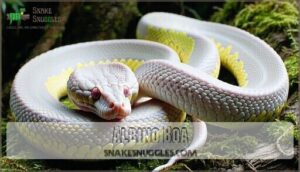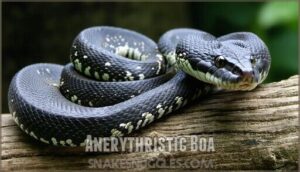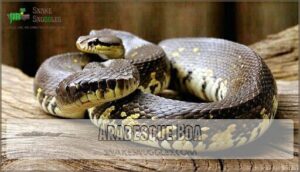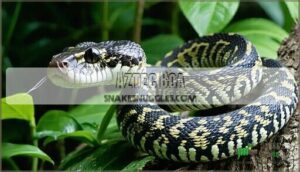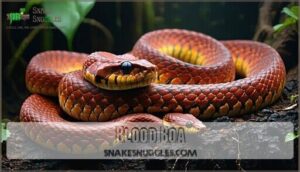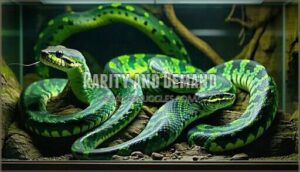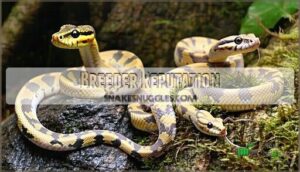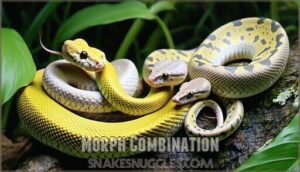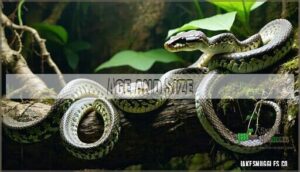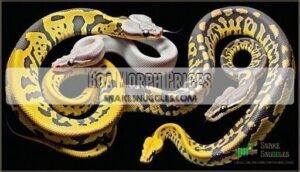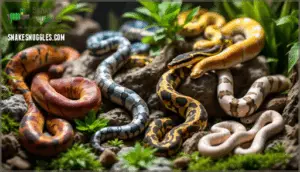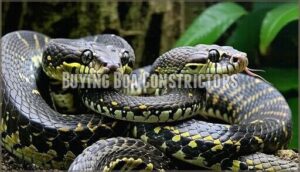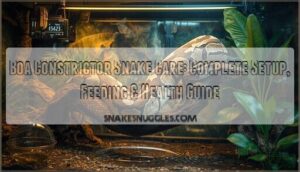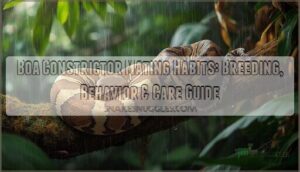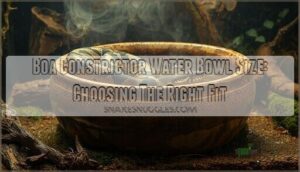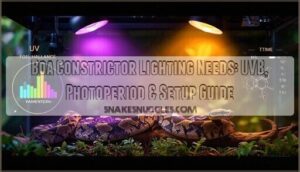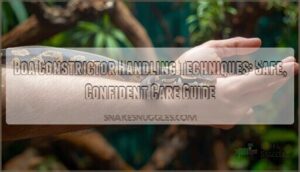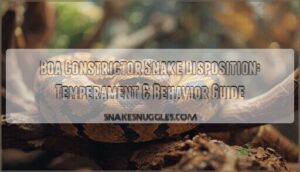This site is supported by our readers. We may earn a commission, at no cost to you, if you purchase through links.
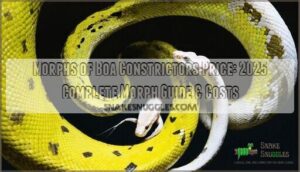 You’ll find morphs of boa constrictors price ranging from $50-150 for normal juveniles to over $5,000 for rare designer combinations.
You’ll find morphs of boa constrictors price ranging from $50-150 for normal juveniles to over $5,000 for rare designer combinations.
Common morphs like anerythristic boas cost $200-400, while striking albinos command $800-1,500.
Blood boas and multi-gene combinations push prices into thousands due to their genetic rarity and breeding potential.
Factors like breeder reputation, age, size, and specific trait combinations dramatically impact costs.
The boa morph market operates like a genetic lottery where understanding these price drivers becomes your ticket to smart purchasing decisions and avoiding costly mistakes.
Table Of Contents
- Key Takeaways
- Boa Constrictor Morphs
- Factors Affecting Price
- Boa Morph Prices
- Health Considerations
- Buying Boa Constrictors
- Frequently Asked Questions (FAQs)
- Where can I buy boa constrictors?
- What is a morph in a boa constrictor?
- Are boa constrictors a good pet snake?
- What is a boa morph?
- How much does a sterling Boa morph cost?
- Are pet Boas morphs?
- How much is boas?
- What is the rarest species of boa?
- Do morphs affect boa constrictor lifespan?
- Which morphs have feeding difficulties?
- Conclusion
Key Takeaways
- You’ll pay dramatically different prices – Normal juveniles cost $50-150, common morphs like anerythristic run $200-400, while rare designer combinations can reach $5,000+ depending on genetic rarity.
- Breeder reputation affects your investment – Established breeders command premium prices but offer genetic guarantees, health records, and ongoing support that protect your purchase long-term.
- Multi-gene combinations multiply costs – When you combine traits like albino with motley patterns, you’re looking at thousands rather than hundreds because these complex genetics create stunning specimens with serious breeding potential.
- Factor in lifetime expenses beyond purchase price – You’ll need to budget for annual vet checkups ($50-100), emergency treatments ($50-1,000+), and proper enclosure setup since these snakes live 20-30 years.
Boa Constrictor Morphs
You’ll discover that boa constrictor morphs are genetic variations that create stunning color and pattern changes while keeping the snake’s natural behavior intact.
These mutations affect how pigments develop in the snake’s scales, resulting in everything from bright albinos to dark anerythristic patterns that make each morph unique and highly sought after by reptile enthusiasts who appreciate stunning color.
Albino Boa
Albino genetics eliminate melanin production, creating striking yellow and white visual variations that command premium boa constrictor morph value.
Stunning albino genetics transform ordinary boas into premium yellow-and-white treasures worth every penny.
You’ll face breeding challenges since albinism is recessive, requiring careful genetic planning.
Despite myths, albino lifespan matches normal boas with proper care specifics including UV protection.
Snake morph prices for albinos typically range $200-$400, making them accessible entry points into boa constrictor morphs collecting.
Anerythristic Boa
Anerythristic genetics remove red pigmentation from boa constrictor morphs, creating striking black, white, and gray specimens.
These snakes showcase remarkable color variations through their high-contrast patterns. You’ll recognize identifying traits like silver-gray base colors and bold black saddles.
- Anerythristic genetics: Recessive trait requiring two copies for expression
- Color variations: Range from light silver to deep charcoal tones
- Breeding potential: Creates ghost combos when paired with hypo morphs
- Care specifics: Standard boa requirements with no special needs
Snake morph prices for anerythristic boas typically range $200-$350, making them accessible designer morphs. Ethical breeders also prioritize genetic screening to guarantee healthy offspring.
Arabesque Boa
You’ll recognize these pattern variations in Arabesque boas, which are dominant mutations founded by Steve Hammond.
Arabesque genetics create distinctive ornate patterns resembling decorative swirls, making identifying Arabesque specimens straightforward for experienced keepers.
Pattern variations range from subtle to dramatic depending on genetic expression.
Arabesque breeding programs focus on enhancing these intricate designs while maintaining healthy bloodlines.
Arabesque care requirements remain standard for boa constrictor morphs, though their unique genetics command higher boa morph prices than basic specimens.
Aztec Boa
You’ll discover Aztec genetics create bold geometric patterns resembling ancient artwork.
This morph transforms your boa’s appearance through dominant genes that intensify color patterns and create striking visual contrasts in the reptile morph market.
Key Aztec Pattern Features:
- Geometric saddle shapes – Sharp-edged patterns replace typical rounded markings
- Enhanced contrast – Color intensity increases between light and dark areas
- Breeding potential compatibility – Works well with other boa constrictor morphs for designer combinations
Pattern variations range from subtle geometric hints to dramatic angular designs.
Similar morphs include Motley and Jungle patterns, but Aztec’s distinctive sharp edges set it apart.
When shopping boa morph prices, expect Aztec genetics to command premium costs due to their visual impact and breeding value in creating multi-gene combinations.
Blood Boa
You’ll find Blood Boa genetics create stunning red-orange coloration through selective breeding programs.
These boa constrictor morphs showcase deep crimson patterns that intensify with age, making Blood Boa colors highly sought after.
Blood Boa breeding requires understanding recessive traits, while proper Blood Boa care guarantees their impressive Blood Boa lifespan of 20-30 years.
Morph market prices reflect their boa constrictor morph value, with boa constrictor price range varying substantially based on bloodline quality.
Factors Affecting Price
When you’re shopping for boa constrictor morphs, several key factors determine how much you’ll pay.
Understanding these price drivers helps you make informed decisions and budget appropriately for your desired snake.
Rarity and Demand
Rarity drives boa constrictor morph value more than any other factor.
Limited availability creates intense morph popularity among collectors who view unique traits as investment potential.
When breeders produce few specimens of rare boa morphs, morph market prices skyrocket.
Your boa constrictor price range depends on how many others exist.
Supply and demand economics rule the boa constrictor morph value marketplace completely, and rare boa morphs are a key factor in this dynamic.
Breeder Reputation
Established snake breeders command premium prices because their reputation reflects years of careful breeding practices and customer satisfaction.
You’ll pay more for boa constrictor morphs from trusted sources, but you’re investing in quality genetics and ongoing support.
- Genetic Guarantees – Reputable boa breeders provide written guarantees about morph genetics and health records
- Breeding Practices – Ethical breeders maintain detailed lineage records and follow responsible breeding standards
- Customer Reviews – Established snake breeders have verified customer feedback and positive testimonials from previous buyers
Morph Combination
Multiple morph combinations dramatically amplify boa constrictor prices.
When you combine recessive genes like albino with dominant traits such as motley, the resulting combo aesthetics create stunning specimens worth thousands.
These breeding potential powerhouses reveal future morphs, making boa constrictor genetics investments skyrocket.
Complex boa morphs showcase intricate patterns that justify premium boa constrictor price ranges in today’s competitive market.
Age and Size
Age substantially impacts boa constrictor morphs pricing.
Juvenile pricing starts lower since you’re waiting for full adult size development.
Growth rate varies among morphs, with most reaching adult size in 3-4 years.
Size impact becomes clear as larger boas command higher prices due to breeding potential.
Lifespan costs extend 20-30 years, making initial investment worthwhile for quality boa constrictor morphs, which can be a significant factor in their long-term value.
Boa Morph Prices
You’ll quickly discover that boa morph pricing varies dramatically based on genetics, rarity, and market demand.
Understanding these price ranges helps you budget appropriately and avoid overpaying for your desired morph combination, which is crucial for making informed decisions based on market demand.
Common Morphs
Popular boa morphs offer excellent entry points for new keepers.
Normal boa constrictors cost $50-150, while hypomelanistic morphs range $150-300. Albino variants typically sell for $250-500, showcasing striking visual appeal.
Anerythristic morphs average $200-350, providing solid genetic traits.
<strong>Boa constrictors</strong> have nine accepted subspecies.
These beginner morphs maintain steady morph availability, making them accessible choices for enthusiasts exploring boa constrictor morph diversity.
Rare Morphs
High-end boa morphs command exceptional prices, with new mutations reaching $5,000-$6,000 when first released.
Selective breeding produces genetic uniqueness in rare boa morphs like IMG and Extreme Granite, typically selling for $1,000-$5,000.
Future trends show these highend boa morphs stabilize at 30-50% lower prices within four years as availability increases through continued breeding programs.
Designer Morphs
Designer morphs represent the pinnacle of boa constrictor breeding, combining multiple genes to create stunning visual appeal.
These boa constrictors showcase exceptional morph genetics, with combinations like Sunglow Motley commanding $800-$2,500.
You’ll find designer boa constrictors offer significant investment potential, especially three-gene projects priced for future breeding value.
Recessive genes require two copies for expression.
Breeding ethics matter when selecting these premium morphs for your collection, considering the importance of future breeding value.
Price Comparison
When comparing boa constrictor prices across platforms, you’ll discover striking differences in morph affordability and combo costs.
Online marketplaces consistently offer better boa prices than pet stores, with professional breeders commanding premiums for ethical sourcing.
- Juvenile pricing runs 30-50% below adult costs
- Lineage impact adds 10-30% to breeder prices
- Seasonal sales provide 15-25% discounts on boa morphs
Health Considerations
When you own a boa constrictor morph, you’ll face health expenses that can substantially impact your budget beyond the initial purchase price.
Understanding these veterinary costs helps you prepare financially for both routine care and unexpected medical emergencies that can arise with these beautiful serpents.
Common Health Issues
While boa constrictors are hardy reptiles, they face several health challenges that every owner should recognize.
Respiratory infections top the list, often caused by poor humidity control. Scale rot develops from excessive moisture, while parasite control requires regular fecal testing.
Boa constrictors also require specific care, so it’s important to understand their long-term commitment.
| Health Issue | Primary Cause | Key Symptoms |
|---|---|---|
| Respiratory Infections | Poor humidity/temperature | Wheezing, nasal discharge |
| Scale Rot | Excessive humidity | Discolored, sloughing scales |
| Internal Parasites | Poor hygiene | Weight loss, feeding issues |
| Mouth Rot (Stomatitis) | Bacterial infection | Inflamed gums, difficulty eating |
Preventative care beats emergency treatment every time. Regular enclosure cleaning and proper environmental controls prevent most common health issues in boa constrictor morphs.
Emergency Vet Visits
When faced with serious complications, you’ll need swift veterinary care for your boa. Emergency situations can escalate quickly, requiring immediate professional intervention to prevent permanent damage or death.
Common emergency scenarios requiring immediate attention:
- Prolapse Treatment – Organ protrusion needs urgent repositioning
- Scale Rot – Severe bacterial infections spreading rapidly
- Trauma Care – Injuries from falls or cage accidents
- Toxin Exposure – Poisoning from cleaning chemicals or plants
Emergency vet visits typically cost $100-500, with Snake Anesthesia and specialized procedures increasing expenses substantially. Boa owners may seek products for treatment of prolapse.
Preventative Care
Preventative care puts you in control of your boa’s health.
Annual veterinary checkups catch problems early, while proper humidity levels and temperature gradients prevent respiratory infections.
Choose appropriate substrate to avoid scale rot, and maintain strict quarantine protocols for new animals.
Regular inspection prevents shedding issues and parasite problems before they become expensive emergencies.
Accurate readings from a boa humidity gauge are essential to ensure the health and well-being of your boa, making preventative care a crucial part of boa ownership.
Veterinary Costs
Understanding veterinary expenses helps you budget properly for your boa constrictors throughout their lives.
Annual checkups with an exotic vet typically cost $50-$100, while emergency treatment can escalate dramatically.
Consider these key expense categories:
- Annual Checkups – $50-$100 yearly for preventative care
- Emergency Treatment – $50-$1,000+ for common ailments like respiratory infections
- Pet Insurance – $10-$20 monthly with limited reptile coverage
Smart owners maintain emergency funds since veterinary care costs vary substantially by location and complexity.
Breeding snakes may also require careful attention to environmental and dietary needs to guarantee their health.
Buying Boa Constrictors
Once you’ve decided on your ideal boa morph, you’ll need to find a reliable source that guarantees healthy animals with verified genetics.
Your purchasing options include reputable breeders, online retailers, pet stores, and rescue organizations, each offering different advantages regarding price, selection, and animal quality.
This includes considering factors such as the health of the animals, which is crucial for making an informed decision.
Reputable Breeders
Professional breeders with established snake breeder reputation prioritize animal health over profit, offering genetic guarantees and ethical sourcing.
Trusted breeders deliver healthy genetics, verified lineages, and lifelong support for your investment.
Their breeding practices guarantee healthier boa constrictor morphs** through health verification and detailed lineage tracing.
It’s important to research reliable boa breeders before making a purchase.
You’ll find morph boa breeders typically charge within the standard boa constrictor price range of $50-$150 for juveniles, with captive-bred boa morphs being more docile and disease-free than imported stock.
Online Purchases
Online retailers and major breeders showcase extensive boa constrictor morphs with verified genetics and health guarantees from reputable sellers.
You’ll find morphs ranging from $50 commons to $5,000+ designers, complete with photos, lineage details, and proper sexing documentation.
Most offer live arrival guarantees and expert shipping.
Remember to calculate cage size requirements before your online purchase arrives.
Pet Store Options
Pet stores stock common boa constrictor morphs and wild-phase specimens, typically priced $60-$200—higher than direct breeder purchases.
Store reputations vary substantially regarding sourcing practices and health guarantees.
Staff often lack specialized reptile expertise, potentially causing boa morph identification errors, and beginner morphs like Colombian Red Tails are commonly available.
But pricing variance reflects limited knowledge of boa constrictor morph guides and proper types of boa morphs classification.
Adoption Fees
Rescue boas offer budget-friendly alternatives to expensive boa constrictor morphs, with adoption fees typically ranging from $25-$75.
This ethical adoption process helps rehome animals while providing substantial savings compared to breeder prices. Many adopters start by researching local rescues to find available boas.
- Fee Variations: Common morphs cost $40-$60 through rescues versus $150-$300 at pet stores
- Adoption Benefits: Lower costs, health history provided, and supporting animal welfare organizations
- Adoption Process: Requires proof of proper enclosure setup and husbandry knowledge before approval
- Ethical Adoption: Prioritizes animal welfare over profit, often including basic supplies with your new boa
Frequently Asked Questions (FAQs)
Where can I buy boa constrictors?
You can buy boa constrictors from reptile breeders, online reptile stores, pet stores, or rescue organizations. Breeders offer the best health guarantees and genetics, while rescues provide budget-friendly adoption options.
What is a morph in a boa constrictor?
A morph represents genetic mutations that alter your boa’s color and pattern without affecting its anatomy or functionality.
These DNA sequence changes determine pigment production, creating hundreds of stunning variations while maintaining breed consistency across generations.
Are boa constrictors a good pet snake?
Boa constrictors make excellent beginner snakes because they’re docile, hardy, and straightforward to care for.
You’ll find them forgiving of minor husbandry mistakes while offering decades of companionship through proper care.
What is a boa morph?
Genetic mysteries reveal when you discover boa morphs—fascinating color and pattern mutations that transform ordinary snakes into living artwork.
You’re witnessing DNA alterations that change pigment production and distribution while maintaining the species’ core characteristics and health, which is a result of these genetic mysteries.
How much does a sterling Boa morph cost?
Looking to add this highly sought-after morph to your collection?
You’ll typically pay $800-$2,000 for a Sterling boa, though exceptional specimens or breeding-quality animals can command much higher prices in today’s market.
Are pet Boas morphs?
Hundreds of different genetic mutations exist across boa species worldwide.
Yes, you’ll find that most pet boas are morphs—genetic variants with altered colors and patterns.
These mutations don’t affect their health or care requirements, just their stunning appearance.
How much is boas?
Common boas cost $50-$150, while morphs range $200-$ Rare combinations can reach $10,000-$15, You’ll find standard varieties affordable, but unique genetics command premium prices from specialized breeders.
What is the rarest species of boa?
Like finding treasure in a dragon’s lair, you’re seeking nature’s rarest serpentine jewel.
The Madagascar ground boa holds that crown—critically endangered with fewer than 1,000 individuals surviving in fragmented forest patches across Madagascar’s shrinking wilderness, specifically the critically endangered species.
Do morphs affect boa constrictor lifespan?
Boa constrictor morphs don’t directly affect lifespan since they’re just color and pattern variations.
You’ll find that proper care, environment, and genetics matter more than whether your boa’s albino or normal-colored.
Which morphs have feeding difficulties?
Feeding troubles aren’t randomly distributed across morphs—you’d think evolution would weed out the picky eaters.
Most boas eat without issues, but specific genetic combinations can cause neurological problems affecting strike accuracy and swallowing reflexes in certain morph lines, particularly those with issues related to genetic combinations.
Conclusion
Sarah discovered a stunning albino boa at a reptile expo, but the $1,200 price tag shocked her budget expectations.
Understanding morphs of boa constrictors price prevents such surprises and guides smart purchasing decisions. You’ve learned that normal boas cost $50-150, while rare designer combinations reach $5,000.
Breeder reputation, genetic rarity, and morph combinations drive these dramatic price differences.
Research thoroughly, budget for ongoing care costs, and choose reputable breeders to make certain you’re investing wisely in your future serpent companion.
- https://www.youtube.com/watch?v=Qx_xVWYXpBA
- https://community.morphmarket.com/t/what-are-some-of-the-best-boa-constrictor-morphs-to-invest-in/49560
- https://www.xyzreptiles.com/how-much-do-red-tail-boas-cost/
- https://www.reddit.com/r/snakes/comments/yrxsce/favorite_morphs_you_dream_of_owning_cheap_or/
- https://www.beyondthetreat.com/ball-python-morphs/

